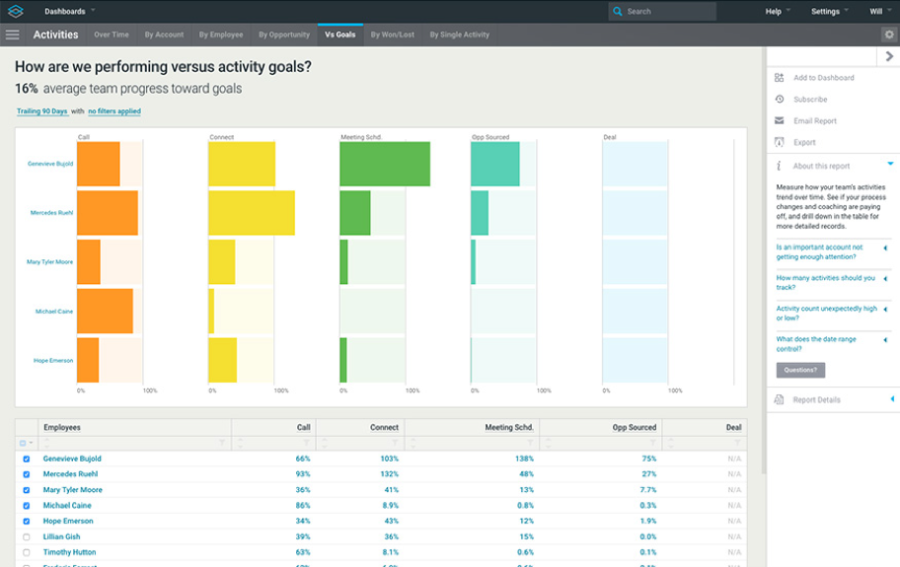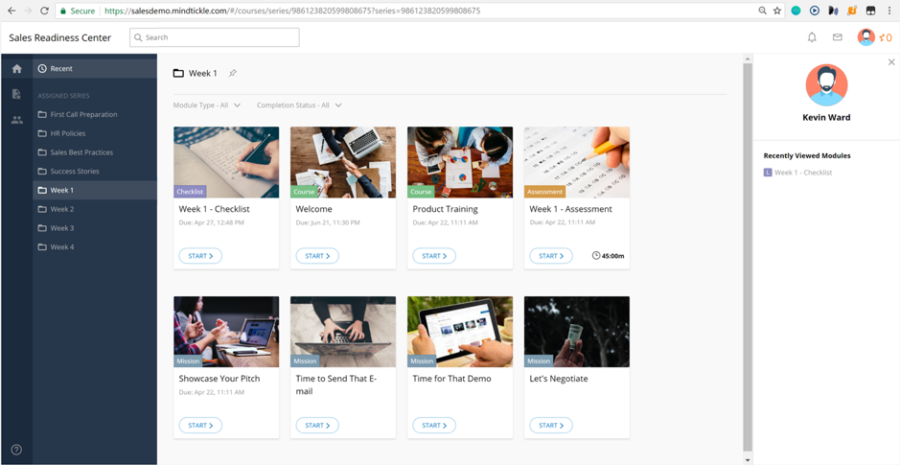Coaching your sales team takes up your time and money – but, investing in a sales coaching program can work wonders for your business and especially help you improve your sales.
And sure, it can also seem like a very complicated task – creating a sales coaching program and implementing it successfully – but its results will more than makeup for it.
In this blog post, I’m going to show you how to start a sales coaching program for your business.
Key Highlights:
- Sales coaching is about nurturing your team’s potential, not just instructing them, leading to stronger results and lower turnover rates.
- Companies with robust sales coaching programs achieve up to 28% higher win rates and experience greater annual revenue growth.
- Using data-driven insights is essential for identifying strengths, weaknesses, and areas of improvement both for the team and individual reps.
- Incorporating diverse coaching styles, like skill enhancement, tactical guidance, and motivational strategies, ensures a comprehensive approach.
- Dynamic learning methods, such as micro-learning and video-based coaching, boost engagement and allow reps to learn flexibly.
- Investing in the right tools, like MindTickle or CRM platforms, streamlines the creation, delivery, and tracking of coaching content and performance metrics.
What Does a Sales Coaching Program Actually Mean and Why Do You Need It?
Sales coaching is not about telling your sales team what they need to do; rather, it’s a way to help them reach their full potential and enable them to make better-informed decisions.
It involves:
- Analysing the results of your team to understand what works and what doesn’t, as well as what weaknesses and strengths you have as a team
- Looking at each individual sales rep in your team and uncovering their strengths and weaknesses
- Helping nurture sales reps’ strengths and try to find solutions to overcome their weaknesses
- Consistently providing your sales team with the right information, knowledge and support they need in order to perform their jobs
- Consistently analysing the performance of your team at an individual level to keep finding solutions and optimising your sales strategy
The big reason why (good) sales coaching is so important is that it actually helps you improve your sales while bad coaching or no coaching can have very negative effects on your results.
For example, here are some interesting stats about sales coaching:
- Companies that develop dynamic sales coaching programs (incorporating video coaching technology) achieve up to 28% higher win rates
- Companies that provide quality coaching can reach 7% greater annual revenue growth
- On the other hand, if your salespeople feel like their manager is a poor coach, they’re more likely to leave their job (as much as 60% of sales reps!)
- Sales reps who receive 30 minutes or less coaching per week have a win rate of 43%, while those who receive at least 2 hours’ worth of coaching every week have a win rate of 56%
So while it’s true that sales coaching can be a considerable investment for your business, it’s also well worth the results in the long run. And the best way to go is with a clear strategy/program – this way, you can ensure you are always consistent and always growing and boosting your sales.
Start with Data to Discover Strengths and Weaknesses
Data should be a huge part of your sales coaching program because this is how you find the strengths and weaknesses of your sales program, as well as of individual sales reps.
This knowledge will then help you build the perfect coaching strategy, as you’ll know what you need to focus on.
To gather and analyse this data, use your CRM tool’s analytics or a tool like Tiles that pulls data from your Salesforce CRM:
Here are some of the things you should look for when analysing your sales data:
- Keep track of your conversion metrics
- Look at historical data to see how your results have changed over time
- Compare each sales reps’ performance to their overall performance over time, as well as with the average sales team performance to see whether
- Set (realistic) sales performance goals and compare the performance of your sales team versus your goals
Use data – historical and new – to understand why your sales performance isn’t where you want it to be, both overall and at an individual level; this will then help you understand what areas need improving so that you can coach each sales rep as needed.
Use Different Sales Coaching Styles
As a sales coach, you need to be versatile and cover different areas in order to truly help your team reach their full potential.
For example:
- Focus on specific skills: uncover each team members’ best skills and help them further grow these skills. Plus, check each of their skills (emailing and messaging, sales calls, etc.) to help them develop each skill in turn;
- Focus on the sales tactics: are your sales reps using the right tactics for outreach, cold calling, qualifying leads, etc.? Help them grow by explaining how each tactic works best;
- Motivate and encourage your team: even the best sales reps sometimes need motivation and encouragement to boost their performance – and some sales reps will need it even more often. Sometimes, it’s not about tactics and strategies, but rather about emotion and motivation – make sure your sales team is motivated and wants to achieve their goals; for example, you can use gamification to motivate your team as they win points (and even prizes eventually) for their wins.
Create Content to Help You Coach Your Team
As I mentioned earlier when I shared some statistics about sales coaching, a dynamic sales coaching program with video coaching technology can work wonders on your results: up to 28% higher conversion rates.
One way to do this is with micro-learning; for example, create short videos for coaching purposes, create simulated sales scenarios or video role plays, create polls to find out what issues your team is facing, and so on.
That said, you’ll also need a platform where you can easily post all of this content when needed and where your salespeople can easily access the content, wherever they may be. The more convenient it is for everyone involved, the better – both the coach/manager and the sales reps will save time, while the sales reps are also improving their knowledge and skills.
You can use a tool like MindTickle to publish and manage your content, while also keeping track of your sales reps and gathering important data:
Plus, you can also use it to create onboarding programs for new sales reps, as well as to analyse the performance and skills of your sales team to further improve their performance overall and at an individual level.
7 Common Mistakes to Avoid in Sales Coaching
Sales coaching can significantly boost your team’s performance, but certain missteps can derail even the best intentions. Here are common mistakes to avoid when coaching your sales team:
- One-Size-Fits-All Approach: Treating every sales rep the same ignores their individual strengths, weaknesses, and learning styles. Tailor your coaching to address specific needs for maximum impact.
- Focusing Solely on Weaknesses: Constantly pointing out areas of improvement can demotivate your team. Balance this with recognizing and nurturing their strengths.
- Inconsistent Coaching: Sporadic coaching sessions fail to create long-term improvement. Regular, structured coaching helps embed skills and strategies into daily practices.
- Neglecting Data-Driven Insights: Coaching without analyzing sales metrics can lead to guesswork. Use data to identify trends, weaknesses, and opportunities for targeted coaching.
- Lack of Feedback Follow-Up: Offering feedback without revisiting progress wastes coaching efforts. Consistent follow-ups ensure the implementation of coaching advice and track improvements.
- Ignoring Emotional and Motivational Needs: Sales isn’t just about skills—it’s also about mindset. Overlooking your team’s emotional well-being can hinder their performance.
- Overloading with Information: Bombarding sales reps with too much information at once can overwhelm them. Break coaching into manageable, actionable steps.
Integrating Technology in Sales Coaching
Leveraging technology in sales coaching enhances efficiency, provides insights, and creates dynamic learning experiences. Here’s how to effectively integrate technology into your sales coaching program:
- Use CRM Analytics for Performance Insights: Tools like Salesforce or HubSpot provide detailed data on conversion rates, pipeline stages, and individual rep performance. This data helps you identify coaching needs.
- Implement Video-Based Coaching: Platforms like MindTickle or Lessonly allow for role-playing scenarios, video assessments, and on-demand micro-learning sessions. This fosters continuous development and engagement.
- Gamify the Coaching Experience: Incorporate gamification elements such as leaderboards, badges, and rewards to motivate your team and make learning fun.
- Leverage AI-Driven Tools: AI-powered platforms like Gong.io and Chorus.ai analyze sales calls and emails, providing actionable feedback on communication and deal progression.
- Create On-Demand Learning Resources: Equip your team with accessible training modules, tutorials, and FAQs so they can learn at their own pace and revisit key concepts as needed.
- Enable Real-Time Feedback: Tools like Slack or dedicated coaching apps allow managers to provide immediate feedback on sales interactions, enabling reps to correct course quickly.
- Track Progress with Dashboards: Use coaching tools with progress-tracking dashboards to visualize team improvement and individual milestones.
Wrapping Up
As you can see from the statistics shared in this article, sales coaching can make a huge difference to your results and revenue.
But even more so when you develop an actual sales coaching program – one that is ongoing so that you can constantly find new ways to help improve each of your sales team members’ performance.
That means monitoring and analyzing your sales data consistently and then using that knowledge to help each sales rep develop their skill set, find the motivation they need to perform well, and generally help them in any way they need to be the best possible sales reps they can be.

